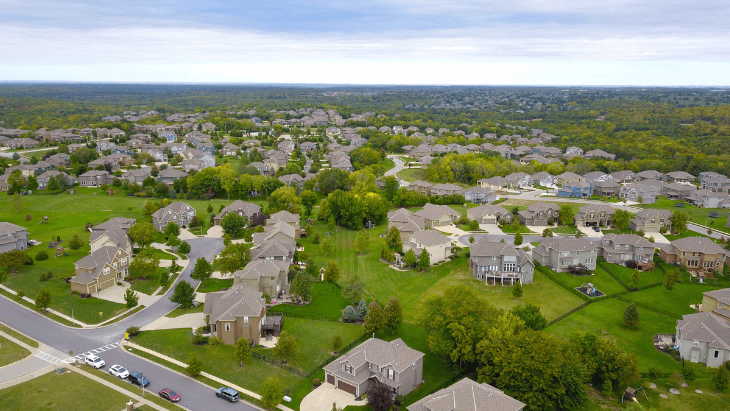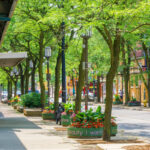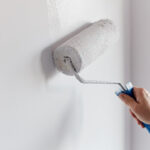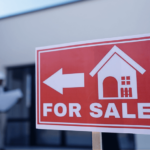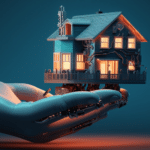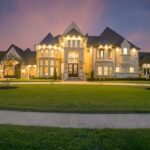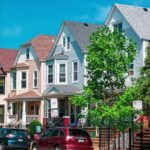The prices of homes have continued to fluctuate over the years. And even though prices are high in most places now, there are many Americans who jumped into the housing market at just the right time. These people find themselves in a home and neighborhood they like, without spending an arm and a leg to live there.
We wanted to find which parts of the U.S. have the best return on their investment, so we analyzed American Housing Survey data to find the average rating residents attribute to their homes and neighborhoods. We then compared these rankings to the median home value to find the places with the most housing bang for your buck. Read on to see if your city made the cut.
Key Takeaways
- Detroit, MI, Rochester, NY, and Birmingham, AL, residents found the most housing bang for their buck.
- San Francisco, CA, San Jose, CA, and Seattle, WA, residents paid more for housing happiness than other cities.
- Nearly 1 in 5 Americans attribute half of their home’s value to their neighborhood.
- Nearly 3 in 4 Americans like their home less now than when they first bought it.
- Neighbors’ political views have caused 1 in 6 Americans to dislike their neighborhood.
- For 1 in 6 Americans say they moved to a new state to buy their current home.
The Cities Where Americans Value Their Neighborhoods
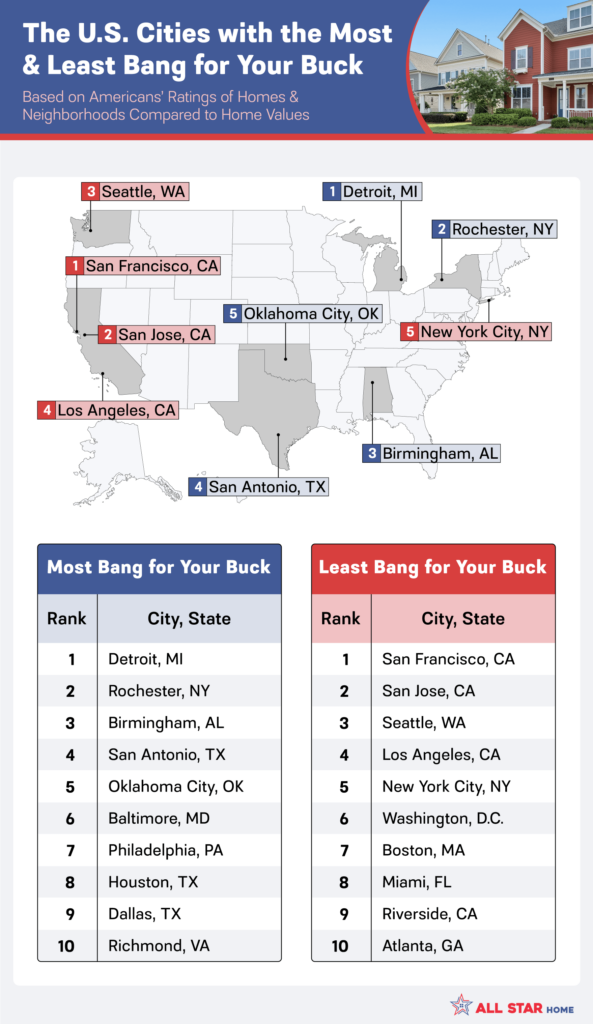
Buying a home can be a stressful, but exciting time for Americans. Many people have their lists of musts in a home or neighborhood, and some are also willing to pay more money for their home to ensure these elements. To determine where Americans are happiest for the lowest price points, we analyzed the rankings that homeowners attributed to their homes and neighborhoods. We then compared those rankings to the median home value in that city to find a bang-for-your-buck ratio.
Coming in first, Detroit, MI, residents reported the highest average rating of their homes and neighborhoods for the lowest average cost. Rochester, NY, and Birmingham, AL, followed closely behind in second and third place, respectively.
On the other end of the spectrum, San Francisco, CA, San Jose, CA, and Seattle, WA, rank as the cities with the least bang for their buck. Although residents in Miami, FL, attribute the highest average value for their homes (8.56 out of 10) and average value of their neighborhoods (8.49 out of 10), Miami ranks eighth for the least bang for your buck due to the higher median home value.
In a survey of homeowners across the U.S., we found that nearly 1 in 5 Americans attribute half of their home’s value to their neighborhood. A desirable location is one of the main contributing factors to property value as buyers look to the neighborhood for a good location, certain amenities and more.
Perhaps some homeowners saw the potential in their homes upon buying. Many Americans took on home improvement renovations amid the pandemic to make the desired changes to their homes. It looks like those upgrades can really make a difference too, as we found that 1 in 4 people say they like their home more now than when they first bought it.
Americans’ Opinions of Their Homes & Neighborhoods
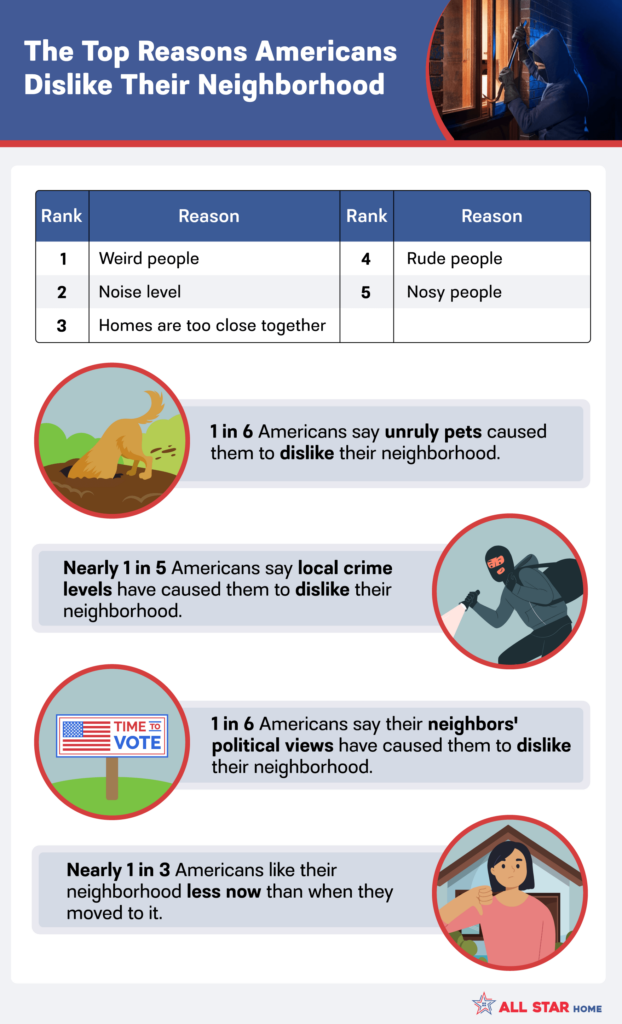
While some Americans have fallen more in love with their homes and neighborhoods while living there, others have started viewing new listings. Overall, 36% of current homeowners are planning to buy a new home due to dislike of their current house or neighborhood.
The main reason Americans have for wanting to move is due to the high cost of living in their current area. According to our survey, 1 in 6 Americans had moved to a new state to buy their current home, perhaps a lower cost of living played a role in that decision to cross state lines.
The second and third most common reasons that people are planning to move are a dislike of their home and a dislike of their neighborhood, respectively. Finally, a dislike for neighbors, too much local crime, and high mortgage payments also contribute to Americans’ desire to find a new home.
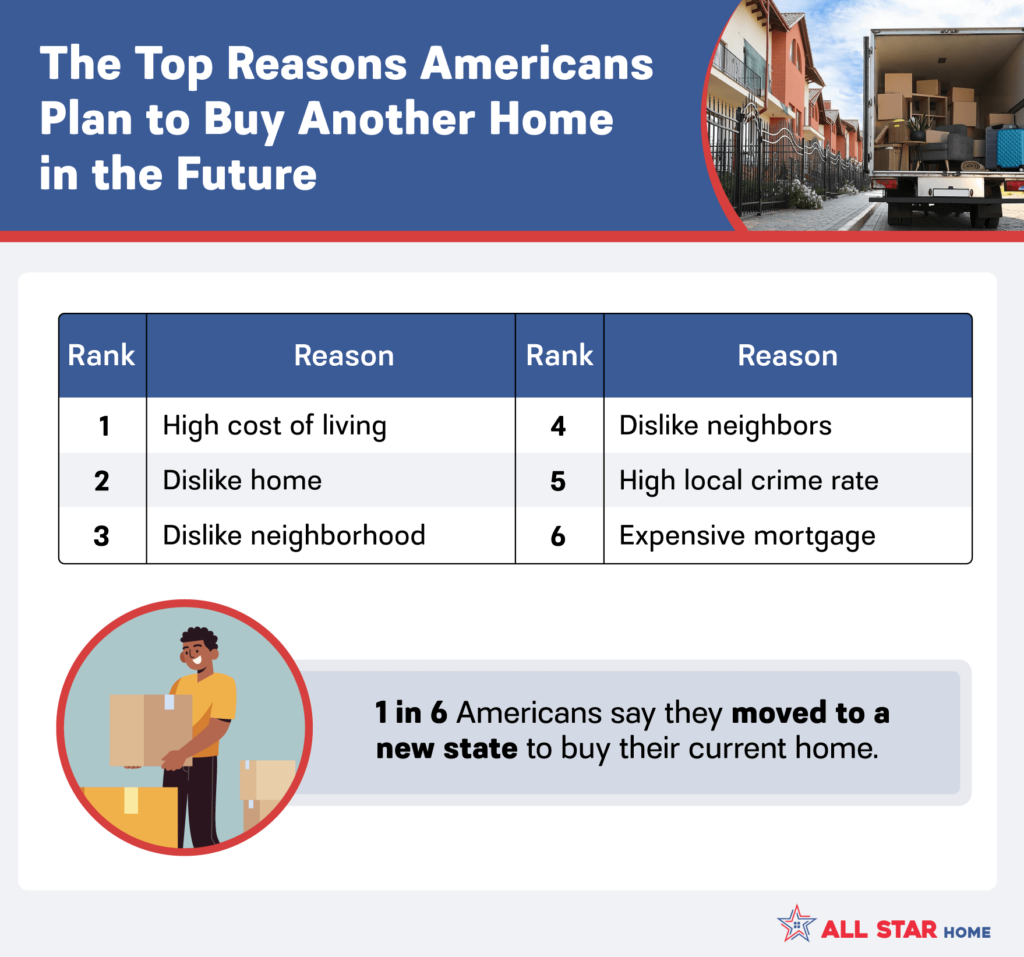
When it comes to a dislike for neighborhoods, we found weird people, noise levels, and homes being too close together are the main causes. In addition, unruly pets and neighbors’ political views also contribute to hate toward neighborhoods.
Other contributing factors include rude and nosy neighbors, cluttered or messy home exteriors, unruly children, and a lack of landscaping at neighbors’ homes.
Conclusion
With an ever-changing housing market, it can be difficult to find your dream home, but don’t give up! Consider viewing listings in the cities with the best bang for your buck to ensure you find the best of both worlds, with a love for your home and neighborhood at the best price.
Your opinion of your house and neighborhood may change, but don’t let a damaged roof or clogged gutters keep you from loving your home. The team at All Star Home specializes in roof repairs, gutter cleaning, and more. So before you start scrolling through house listings, give our team of specialists a call.
Methodology
In this campaign, we analyzed Americans’ opinions of their home and neighborhoods in 25 U.S. cities compared to the local median home value. In the American House Survey conducted by the U.S. Census Bureau, Americans were asked to rate their current home and neighborhood on a scale of 1 to 10. We took the average of responses to assign an average overall rating for each location. We then divided that rating by the area’s median home value to generate a ratio to show where people got the most housing bang for their buck.
In addition, we surveyed Americans across the country to determine how they felt about their current home and neighborhood. We asked a variety of questions from what percentage of your home’s value would you attribute to the neighborhood and do you like your home more or less now than when you first bought it to if you dislike your neighborhood, why, and if you plan to buy another home in the future, why?
